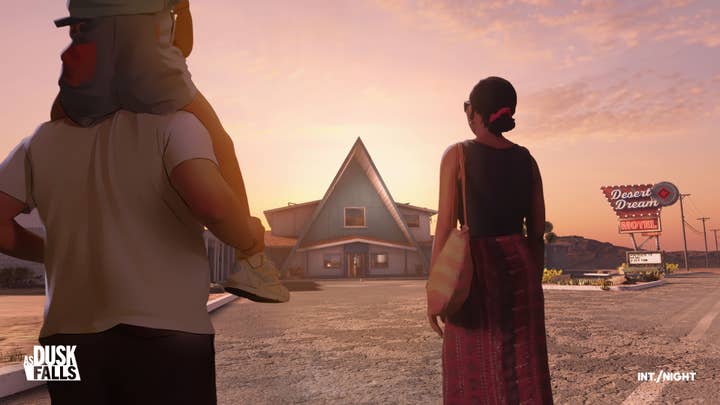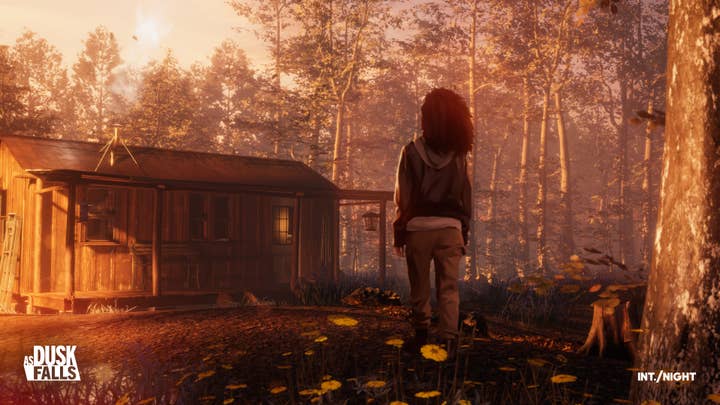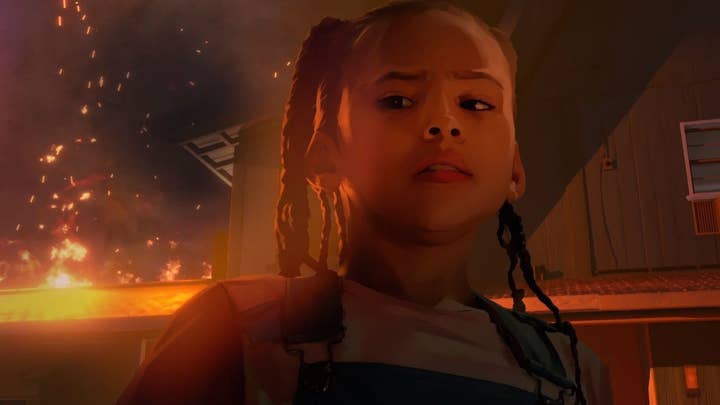Interior Night's mission to turn non-gamers into gamers
We speak to CEO Caroline Marchal about the nuanced narrative of upcoming Microsoft exclusive As Dusk Falls
As mainstream as video games have become, there are still millions of people who do not yet participate in the hobby. These people represent the future growth of the industry, and publishers, developers and platform holders alike are exploring new ways to get them engaged.
Whether it's Google's attempts to bring down the barrier to entry with cloud gaming service Stadia, hypercasual mobile developers focusing on accessible game design to get people playing, or Nintendo hoping to recapture the Wii Fit magic with products like Ring Fit Adventure, there are myriad ways of appealing to non-gamers.
But for Caroline Marchal, CEO of UK developer Interior Night, there's a simpler method: tell them a story.
"I don't think anyone has watched something like this anywhere - and they certainly haven't played this"
"Story is a fundamental element of attracting people to play a game," she says. "We focus 100% on getting a great script with flawed characters that people will find relatable and compelling."
Marchal and her team aim to demonstrate this with their debut title As Dusk Falls, an interactive drama heading to Xbox One, Xbox Series X/S and PC. The game centres on a conflict at a motel in the Arizona desert, in a story that's "not about saving the world, but about deep and intimate relationships."
"We've got two families we focus on across 30 years, so it's got scope and it's a really original story," says Marchal. "I don't think anyone has watched something like this anywhere -- and they certainly haven't played this.
"We confront [the audience] to ask questions about really relatable themes and real-life struggles. Can you break free from a toxic family? Can you start over by moving house or changing jobs? Will all your problems go away? When you have a family, how much of yourself should you sacrifice to meet their needs first? How do you balance your own needs with theirs? All of these are questions and themes that have not been in games before, but are universal and relatable in real life."
In the above behind-the-scenes documentary, Marchal expresses a desire to bring TV audiences to video games, but there's a significant difference between the two sectors. Watching television is a passive experience, with audiences simply absorbing the story. Video games require active participation, which means interactivity can be as much of a potential barrier as it can be a selling point.

Marchal says the key to overcoming this is how you manage tension: "You don't want to have people really uncomfortable playing your game, feeling really stressed out. That's the thing with TV -- your mind is active but you're safe because you're not challenged too much with your reflexes or anything.
"With As Dusk Falls, we're very focused on story first, bringing people into the world and connecting them with the characters. We make sure there's no barrier. I can tell you more when we're able to talk about gameplay. But yes, the stress of just playing a game can get in the way and non-gamers, people who don't usually play, are like, 'Well, it's not really for me.'"
The team is also hoping to bring different perspectives to the game's events, some of which have rarely been explored in games. While Marchal praises Life Is Strange for tackling everyday struggles from a teenager's point of view, As Dusk Falls' cast gives players' insight into multiple generations. The relationships explored here range from a couple in their forties to grandparents and their grandchildren. And although the main event is set on a single night, the story spans three decades, stretching into the past and future.
"The audience is very savvy now. They're not shying away from complex characters or dark stories with a lot of layers"
All this enables Interior Night's writers to tell a broader story than we usually see in video games -- and one that will appeal to the TV audience Marchal is targeting.
"We can look at what a couple in their forties going through, what's it like to be a dad or a mum," she says. "What's it like to lose your job, and what does that mean for your family? How do you cope with that? If there was a trauma in your childhood, how do you overcome that? How do you face your past and choose who you're going to become as an adult?
"These are all experiences people might have directly in their lives, or they might know someone who has been through this. Like any other art form or entertainment, we can talk about real life and we hope the audience reflects about what life means and how we can sometimes navigate through this crazy world."
There is a potential barrier to broader audiences in the form of As Dusk Falls' destined platforms. The game is being published by Microsoft, which means it is theoretically restricted to PC and Xbox consoles. In Newzoo's estimates earlier this year, PC accounted for just 23% of the global games market, and Xbox One is trailing somewhat in the console space -- and there's no telling how well Xbox Series X/S will sell by the time As Dusk Falls arrives.

Meanwhile, mobile represents almost half the global games market on its own. When targeting a broader audience, would it not have made more sense to release on a broader platform?
"It's true, there's a massive audience on mobile, but a lot of people have a console in their household and we want to get the people who don't switch on the console to play," Marchal explains. "We're focusing on the big screens first, because traditionally we've made games for console and PC. But as a studio, we're definitely interested in expanding our reach in terms of platforms in future -- and mobile is definitely one of those."
"Story is a fundamental element of attracting people to play a game"
Microsoft was one of several offers Interior Night received after a deal with Sega fell through, but Marchal says there were three key reasons in selecting the platform holder: Game Pass, the upcoming consoles, and Project xCloud, the cloud streaming service that allows select Game Pass titles to be played on other devices -- including mobile.
"The next generation and Game Pass are great opportunities to widen the breadth of games they offer, and for that to reach a broader audience," she says. "People who wouldn't think to play a narrative game but might try it because of Game Pass.
"And with xCloud, [Microsoft] are not tied to a platform any more, they're broader than that. They're thinking about where to reach the players, and they've got plans for the future. They're not just tied to the console."
Regardless of the platform they play on, Interior Night wants to put a significant amount of the storytelling power into players' hands. As you would expect, As Dusk Falls presents players with a series of choices that dictate the characters' fates. Marchal is confident that not only will these be more nuanced than 'do the Good Thing or the Bad Thing,' they will also lead to a satisfying ending that works for each individual player.
"Every time someone plays, they will craft their own story," she says. "It will be their story specifically because the way they make decisions will be very personal. In the process, they will reveal and learn things about themselves. What are my core values? Why did I make this decision this way? It's because this is important to me, family is important to me, or justice is important to me.
"This is an interactive story, that's what makes it really compelling. You go on this journey with characters, experience loads of emotions, but at the end of the day, you also learn things about yourself. That's the extra aspect of interactivity that no other medium has."

Numerous developers have made such promises in the past, and shown how tough it can be to deliver upon. Most famously, BioWare saw backlash over Mass Effect 3's conclusion, touted as being influenced by choices that extend back to the first game. There are inherent limits to how malleable a video game's ending can truly be, but Marchal says ensuring the journey there is cohesive minimises the potential for disappointment.
"Whatever you do, some people may not be satisfied -- that's a given," she says. "You look at the endings in great TV shows, they're often very brave, they're not what you expect and it sometimes upsets the audience -- but most of the time it's in a good way. It's surprising and engaging. I often compare what we do to the writing work in TV.
"The way we work at Interior Night, we make sure the narrative design is really solid. Every time we ask players to make a decision, we offer all the logical options that make sense in that context. And we also guarantee that the characters don't break their persona, so they're never acting out of character.
"There are simple rules that the player instinctively understands, and then when it leads to the ending, if we've done our job well -- which I think we do -- it means we can deliver a satisfying ending. Although that doesn't mean a happy ending, by the way."
As for the admittedly dated Mass Effect example, Marchal believes that both audiences and developers have evolved since then -- but with that comes higher expectations for quality storytelling.
"People pay a lot more attention to story -- it's a great time to be putting more interactive stories out there," she concludes. "The audience is very savvy now, they understand instinctively how story structure works, they understand how good characters should be written, and they're not shying away from complex characters or dark stories with a lot of layers."


